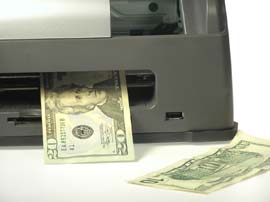Blame the Deficit, Not Free Trade
 We read in the paper “Another 60,000 jobs lost overseas.” We haven’t had a positive balance in trade since 1975. We are losing our domestic manufacturing at an unprecedented rate.
We read in the paper “Another 60,000 jobs lost overseas.” We haven’t had a positive balance in trade since 1975. We are losing our domestic manufacturing at an unprecedented rate.
From almost every direction the cry is made for fair trade.
We are told that we must increase tariffs or our domestic economy will be ruined and we will become a third-world country, that the large multinational corporations are making huge profits at the expense of Americans, and that laws should be passed to prevent them from moving their manufacturing overseas.
While the loss of manufacturing has serious consequences, including a threat to our national security, the answer is not to be found in further restricting free trade.
Theoretically free trade will not, in fact cannot, result in a trade deficit.
Let us assume that the money stock is held constant at 1.6 trillion dollars (the level of M2 in 1980) and the United States unilaterally removed all tariffs.
Companies might immediately import cheaper goods; our balance of trade would initially become negative.
Money would flow out of the United States as commodities flowed in, but this is only a short-term effect. In the long run, as the United States becomes commodity-rich but money-poor, imports would naturally decrease and exports would naturally increase.
To put it another way, if we constantly imported more that we exported, we would run out of money, imports would naturally cease, unless we increased exports to get our money back in order to buy more imports.
How then has it then been possible to maintain trade deficits every year since 1975?
Money Supply
The answer is found in our monetary and fiscal policy.
First, let’s look at the money supply. Since 1959 the money supply (M2) has increased an average of 7.2% per year. This means that the money supply has doubled approximately every 10 years.
In fact, since 1980 the money supply has increased from $1.6 trillion to over $6.8 trillion, which is an additional $5.2 trillion available to buy imports and maintain the trade deficit.
Where did all of that money come from?
It works something like this: If the Fed sees an economic slowdown they seek to stimulate the economy by increasing the overall demand for new products and services.
Now advertising might create more demand for one product, but how do you increase demand for all products in the U.S. economy? Simple: you must increase the supply of money.
When everyone gets more money, they feel the need to spend a large portion of it, and overall demand for new products increases.
 Let’s say that the Fed wanted to increase the money supply by $10 billion. They would do so through their open market operations.
Let’s say that the Fed wanted to increase the money supply by $10 billion. They would do so through their open market operations.
Just like you or I can buy bonds on the open market, so too can the Fed. The difference is that you or I must buy bonds with money that we have saved, while the Fed buys them with money that they create.
In this case, they buy $10 billion in bonds and print the money as payment, so to speak. Those who sell the bonds then put the money in their banks around the country, thus increasing the money supply by $10 billion.
This is not the end, however. 90-97 percent (based on the reserve requirement depending on the size of the bank) of this is again loaned out, which increases the money supply by an additional $9 billion.
All told, that’s an additional $19 billion in potential trade deficit.
Fiscal Policy
Now let’s look at fiscal policy. What happens to all those dollars overseas? Can China spend U.S. dollars in their economy?
No. They do keep a supply (and quite a large supply) on hand in order to manipulate the foreign exchange market in their favor, but they can’t use all those dollars.
The answer lies in our capital markets. Consumer products are not the only demand of money in our economy.
The economy also needs capital to replace worn out equipment, build new factors, and pay new workers etc.
The capital to build these things comes from our savings. We save and buy bonds, stocks, real estate etc. But frankly, we don’t save enough.
In addition, the government competes directly with industry for our saved dollars. The greater the government deficits, the more money is pulled from industry to fund it.
But our savings is not the only supply of capital investment. Central banks and large corporations all over the world have an unending supply of U.S. dollars due to our expanding money supply and constant trade deficit.
Foreign investment in the form of U.S. dollars that we used by buy our imports return and buy our real estate, our companies, and fund our public and private debts.
The circle is complete. The Fed prints money and puts it into circulation by buying private and public debts (bonds). This money allows us to buy more overseas than we sell, creating trade deficits.
The excess money returns to the United States and foreign governments, and investors buy our real estate, companies, and private and public debt. It’s a great program, except in the long run they will eventually own all we have, or more likely they will stop investing in the United States, causing serious strain on our economy.
The solution? Slow down our expanding money supply and stop running government deficits, which will be discussed in subsequent articles.
******************************
 Dr. Shane Schulthies is the president of George Wythe University.
Dr. Shane Schulthies is the president of George Wythe University.
He received his Ph.D. in Exercise Science from Brigham Young University where he subsequently taught for thirteen years. He also has degrees in Physical Therapy and Sports Medicine.
He has a broad background in academics, consulting, business, and government.
He is married to the former Kimberly Hanson. They have ten children and reside in Cedar City, Utah.






Excellent article Dr Schulthies. I’m currently doing research in the UK on how our jobs are moving overseas, and have just submitted a draft paper to a journal called the ‘International Labour Review’. It’s still under review. I came across your article above in a web search. Right now I’m seeing more energy on this issue in the US than in the UK….and yes I did notice that your article was a couple of years old. The level of complacency and apathy here is amazing. First our mining jobs went, then blue collar, now professional work! Keep up the Good Work. Regards and best wishes forthe New Year 2013, Andrew Rothwell